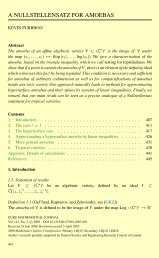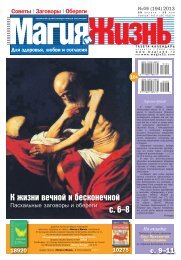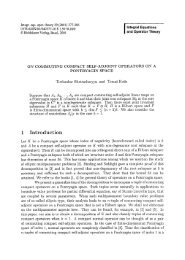computing lives - FTP Directory Listing
computing lives - FTP Directory Listing
computing lives - FTP Directory Listing
You also want an ePaper? Increase the reach of your titles
YUMPU automatically turns print PDFs into web optimized ePapers that Google loves.
A<br />
Computer Previous Page | Contents | Zoom in | Zoom out | Front Cover | Search Issue | Next Page M S BE<br />
aG<br />
F<br />
96<br />
COMPUTER<br />
THE PROFESSION<br />
Computing a<br />
Better World<br />
Kai A. Olsen,<br />
Molde College and University of Bergen, Norway<br />
While government leaders struggle to implement significant<br />
change, <strong>computing</strong> professionals increasingly achieve this goal<br />
as a side-effect.<br />
As <strong>computing</strong> professionals<br />
we have been<br />
involved in many projects.<br />
Most have had a<br />
limited scope, duration, and budget.<br />
These milestones span decades, from<br />
developing a system for sending text<br />
messages between universities and<br />
research centers in 1969, to manufacturing<br />
a chip for a calculator in<br />
1971, to setting standards for electronic<br />
communication in 1974, to<br />
designing a computer system that<br />
offers an improved user experience<br />
in 1981, to simplifying access to scientiflc<br />
papers in 1990, to developing<br />
new technologies for ranking Web<br />
pages in 1996, and to creating an<br />
online student directory with photos<br />
in 2003.<br />
I suspect few people involved in<br />
these projects had any idea they were<br />
changing the world. Yet, in retrospect,<br />
we see this is what really happened.<br />
The Arpanet project gave us the flrst<br />
e-mail system in 1969, Intel developed<br />
the microprocessor in 1971, and an<br />
international effort gave us the TCP/<br />
IP standard for data communication<br />
in 1974. Then, in 1981, researchers<br />
at Xerox Parc designed the flrst<br />
complete graphical workstation; Tim<br />
Berners Lee deflned the basis for the<br />
World Wide Web at CERN in 1990,<br />
Larry Page and Sergey Brin created<br />
the foundations for Google in 1996,<br />
and Mark Zuckerberg created Facebook<br />
in 2003.<br />
CHANGING LIVES<br />
Combined, these <strong>computing</strong><br />
advances have changed the <strong>lives</strong> of<br />
millions throughout the world. In the<br />
industrial countries we work, shop,<br />
play, and socialize using a computer.<br />
Whole business areas are experiencing<br />
this revolution. Music, movies,<br />
and books are now separated from<br />
their physical representation, with<br />
a consequently huge impact on the<br />
industry. Photography has gone<br />
digital. Analog products, such as<br />
fllm, cameras, and their connected<br />
services—are now disappearing.<br />
Newspapers that have existed for<br />
more than 200 years are in danger<br />
of closing down as the competition<br />
from the net becomes overwhelming.<br />
Meanwhile, TV is losing viewers to the<br />
Internet and sites like YouTube.<br />
Physical libraries, with collections<br />
in the form of clay tablets, papyrus,<br />
or books, have been an integral<br />
part of educational institutions for<br />
thousands of years. Today digital<br />
collections are taking over and the<br />
physical library has an uncertain<br />
future in many domains. Companies<br />
that hardly existed flve to ten years<br />
ago—such as Google, Facebook, and<br />
Twitter—are today known by everybody.<br />
New services and applications<br />
are offered every day to make our<br />
<strong>lives</strong> more effective and, perhaps,<br />
more interesting. It is tempting to<br />
compare these trends with politics.<br />
While many state leaders struggle to<br />
implement signiflcant change, <strong>computing</strong><br />
professionals increasingly<br />
achieve this as a side-effect.<br />
CATALYST<br />
Clearly, the <strong>computing</strong> industry<br />
is today’s main catalyst for change.<br />
No other industry has a comparable<br />
impact and none is as dynamic. As<br />
professionals in this area we are<br />
truly shaping the world into something<br />
better—or so we hope. Some<br />
argue that <strong>computing</strong> has become<br />
a commodity, like electricity, something<br />
you still need but that has lost<br />
its competitive advantage. However,<br />
the Googles, YouTubes, Wikipedias,<br />
and Twitters show that the pace has,<br />
if anything, accelerated. So what can<br />
we expect in the next decennium?<br />
eInk offers one new technology<br />
that flows from <strong>computing</strong>. In the<br />
past 10 years it has moved from the<br />
labs to commercial product status.<br />
Continued on page 94<br />
Published by the IEEE Computer Society 0018-9162/10/$26.00 © 2010 IEEE<br />
A<br />
Computer Previous Page | Contents | Zoom in | Zoom out | Front Cover | Search Issue | Next Page M S BE<br />
aG<br />
F

















